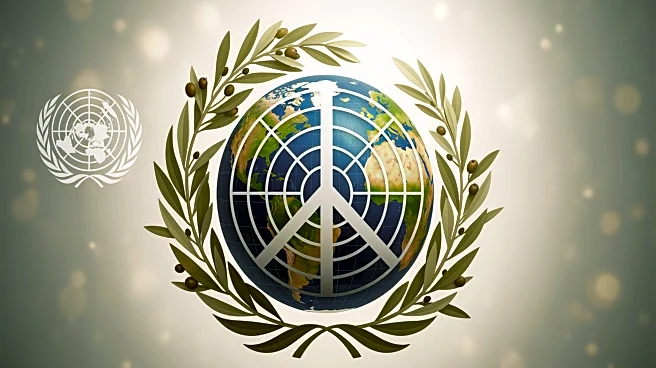What's Happening?
The United States has circulated a draft resolution to the United Nations Security Council proposing the establishment of an international stabilization force in Gaza for a minimum of two years. This initiative is part of President Trump's broader plan
to end ongoing conflict between Israel and Hamas. The draft resolution aims to secure Gaza's borders, protect civilians, and dismantle militant infrastructure, with the force working alongside a trained Palestinian police force. The proposal requires UN Security Council approval, which is crucial for countries to commit troops to the stabilization force. The draft is currently under discussion among the 15-member council and other international partners, with changes being made based on these discussions. The plan emphasizes the need for a Security Council mandate to legitimize the force, as expressed by UN Secretary-General Antonio Guterres.
Why It's Important?
The proposal for a UN-backed stabilization force in Gaza is significant as it represents a major international effort to address the longstanding conflict in the region. If successful, it could lead to the demilitarization of Hamas and potentially pave the way for peace and reconstruction in Gaza. The initiative could also influence U.S. foreign policy and its relations with Middle Eastern countries, particularly those interested in contributing troops. However, the proposal faces challenges, notably from permanent Security Council members China and Russia, who may oppose the resolution. The outcome of this proposal could impact regional stability and the humanitarian situation in Gaza, affecting millions of civilians and the flow of international aid.
What's Next?
The next steps involve extensive negotiations within the UN Security Council to reach a consensus on the draft resolution. The U.S. will need to navigate potential opposition from China and Russia to avoid a veto. If the resolution is approved, participating countries will begin preparations to deploy troops and establish the stabilization force. The force will work closely with Egypt and Israel to secure border areas and ensure the delivery of humanitarian aid. The implementation of the plan will require coordination with international organizations like the United Nations, Red Cross, and Red Crescent to resume aid to Gaza. The success of this initiative will depend on the cooperation of various stakeholders and the ability to maintain a fragile ceasefire.
Beyond the Headlines
The proposal raises ethical and legal questions regarding the sovereignty of Gaza and the role of international forces in domestic affairs. The establishment of a 'Board of Peace' to temporarily govern the territory could lead to debates about governance and self-determination for Palestinians. Additionally, the demilitarization of Hamas poses challenges, as it requires the group's acceptance of disarmament, which has not been fully agreed upon. The long-term implications of this initiative could reshape the geopolitical landscape in the Middle East and influence future peace negotiations.















